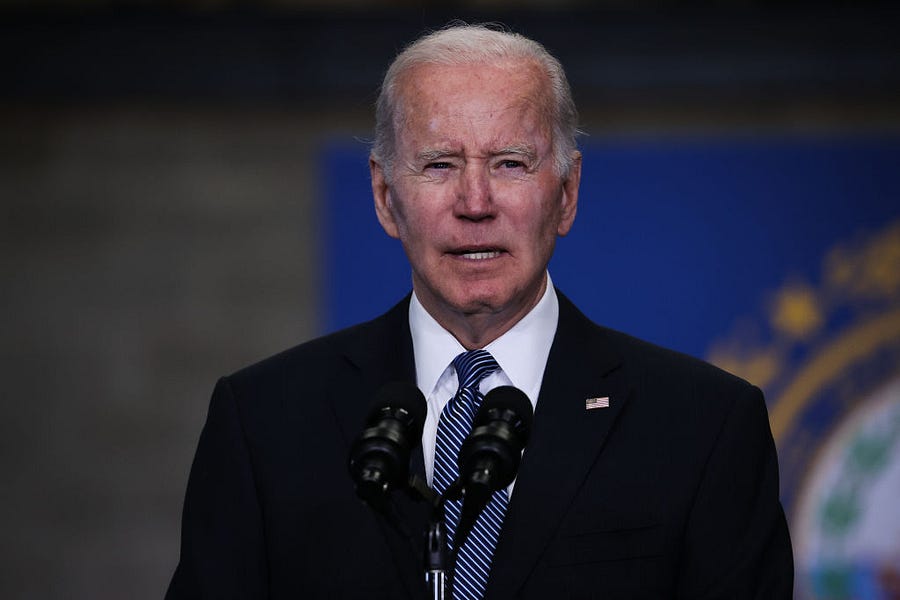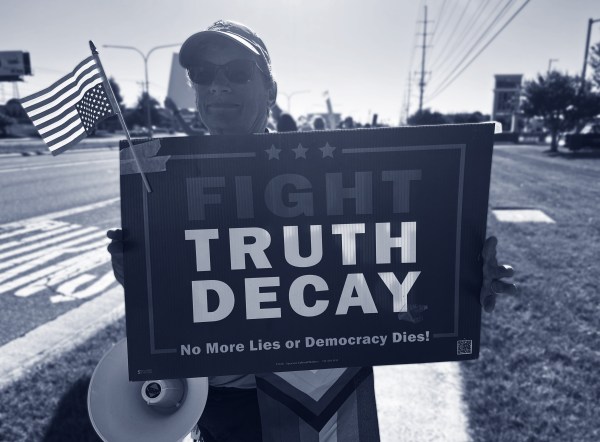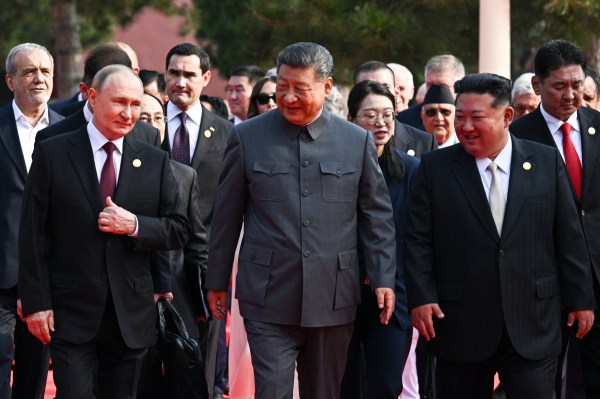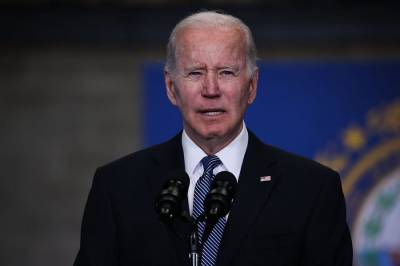During a recent Dispatch Podcast, we dedicated a segment to exploring Joe Biden’s low approval rating and the probable red wave in November. Here we were, four years removed from the same moment in Trump’s presidency—with a very different man in the White House—and somehow we’re experiencing deja vu. Why?
First, a few caveats. It’s hard for a president to be popular now, and midterms are almost always rough for the incumbent party. If you look back at approval ratings since Obama’s first term, the highs aren’t that high, and the lows aren’t that low. For most of the last 13 years, presidential approvals have bumped along in the forties. Low fifties is a cause for celebration.
This is what happens in a nation captured by negative polarization. There are millions of people that aren’t merely unpersuadable—our cocooned media landscape makes them effectively unreachable. It’s not just that opposing messaging doesn’t break through; they’re not even aware of their opponent’s argument.
So perhaps when we engage in rank punditry about Joe Biden, we’re overreading the impact of his decisions—or even the condition of the country—and under-reading the extent to which division is just baked into the cake.
I remember the mistake I made in November 2020. Yes, I accurately predicted that Biden would take the presidency, and the Democrats would take Congress, but the election was closer than I thought it would be. In a post-election reflection, I realized that I should have known better.
When faced with two conflicting streams of information—polls showing a solid Biden win and decades of data demonstrating the permanence of polarization—I put too much emphasis on the polls and too little on the polarization, an especially silly mistake from someone who wrote a whole book about how polarization was driving our nation apart.
But while presidential approval ratings may have low ceilings, there is still a meaningful difference between 52 and 42, or even between 42 and 49. And when it comes to Joe Biden, I think the difference is summed up in a simple sentence that conceals oceans of complexity.
An American nation that was reeling from an extraordinary amount of disease, drama, and division voted for normalcy, but almost nothing is normal.
I say “almost” because Joe Biden, the man, is normal. For good and ill he basically defines the normal American politician. He’s not a social media berserker. Except for his various verbal quirks and foibles, he behaves exactly the way politicians normally behave. American voters replaced a reality television celebrity with one of the longest-serving normal politicians in all of American history.
But when Americans long for normal, it’s not just about tweets and personalities. Leadership exists on a spectrum that includes temperament, ideology, prudence, and (we can’t deny) a degree of luck. And while Biden’s temperament has worked for him, the combination of ideology, imprudence, and just plain bad luck have worked against him.
Let’s start with ideology. I don’t think Biden is an extremist, but I don’t think he’s a moderate either. He’s a moderate Democrat, and as such has moved left with his party. The examples abound.
It wasn’t enough to pass an infrastructure package that Trump couldn’t pass. He had to move towards an FDR-style “Build Back Better” platform that even a president who possessed a popular mandate would struggle to pass.
It wasn’t enough to ratify largely-existing legal protections for LGBT Americans. He had to support an Equality Act that would take direct aim at religious liberty and sweep even into arenas—like athletics—where very real biological differences between men and women should be acknowledged and respected.
It wasn’t enough to try to target electoral reforms at the weak point that almost caused a constitutional crisis, the Electoral Count Act. He had to support a massive, sweeping rewrite of the entire electoral system that included a number of provisions that blatantly violated the Constitution.
Even where Biden’s solidly in the mainstream, he’s suffered from imprudence. The prime example, and the moment where his approval rating really started its decline, was the withdrawal from Afghanistan. I’ve said it many times—Americans wanted to end the war, but they did not want to lose the war. A more prudent leader would have recognized the distinction.
And we can’t forget misfortune. Just as the Afghan Army was collapsing abroad, COVID was coming back here at home. The charts don’t lie. In July and August we began a surge in cases that not only prolonged the pandemic, it led to a tragic surge in deaths that is only just now beginning to subside.
Living as I do right next door to some of the most vaccine-resistant counties in the United States, I’m not sure what Biden could have done differently to increase vaccine rates, but I am sure that he had nothing to do with the Omicron variant and its extraordinary transmissibility.
In which category do we place the Russian invasion of Ukraine? Short of issuing an affirmative security guarantee and taking steps that might have provoked war with Russia, I don’t know if better policy or a different president could have deterred Putin. Putin has carried out military offensives under every president since Bill Clinton (Chechnya under Clinton and Bush, Georgia under Bush, Crimea under Obama, and Syria under Obama and Trump) and he succeeded under every president since Clinton.
Biden’s policies and leadership since Russia’s invasion have been strong. In many ways the results speak for themselves. NATO is united, Russia is isolated, and the western arms that have poured into Ukraine have inflicted staggering losses on the Russian Army. But, still, a massive land war in Europe is anything but normal. For the youngest generations of Americans, talk of nuclear war is anything but normal.
Let’s not forget the mixture of bad policy (overheating the economy), bad luck (a persistent pandemic), and aggressive war (Russia’s invasion) that have resulted in a combination of inflation, labor shortages, and supply chain problems that dramatically impact ordinary American lives. Not normal.
Wait. Have I mentioned crime yet? No? Not normal.
In addition, the political class is in the grips of a social media dynamic that is constantly amplifying the worst and most extreme voices from the other side of the aisle. Earlier today, the Washington Post ran a report revealing the name of the person behind a popular Twitter feed called “Libs of TikTok.”
I’m not going to link to the piece because I don’t like the practice of outing pseudonymous writers absent compelling need, but it’s an account that’s accumulated a big following on the right (including amongst right-wing pundits and politicians) by constantly finding the strangest and most radical left-wing voices.
Some of the radicalism is significant, such as when it impacts public policy, but much of it isn’t. All of it contributes to the sense that “they” are extremists, and “the left” is losing its mind. The left-wing equivalent is a feed called “Patriot Takes.” Again, some of the right-wing extremism it locates is significant, but much is not. All of it makes its readers believe “the right” is truly nuts.
And the effect of all this abnormality is that we don’t feel normal any longer. We stagger under the weight of conflict and change. I’m haunted by this tweet by an English theologian:
I know full well that there is much that is simply out of Biden’s hands. We frequently over-blame presidents for national problems and over-praise them for national success. But in a crucial way he misread the moment. It’s not just that Americans wanted their president to be less dramatic; they wanted their lives to be less stressful.
Perhaps that’s an unattainable goal, at least for now, but when Biden’s policies pushed our nation away from the very thing millions of his voters so desperately desired, he lost an immense amount of goodwill. It’s time for the president to harmonize his temperament, his ideology, and his judgment and center them around a single, simple goal—make America normal again.
Let’s calm down and stabilize our country, and only then should we restart conversations about lasting change.
One more thing . . .
It’s here. Finally. The Thor: Love and Thunder trailer. Is it July yet?







Please note that we at The Dispatch hold ourselves, our work, and our commenters to a higher standard than other places on the internet. We welcome comments that foster genuine debate or discussion—including comments critical of us or our work—but responses that include ad hominem attacks on fellow Dispatch members or are intended to stoke fear and anger may be moderated.
With your membership, you only have the ability to comment on The Morning Dispatch articles. Consider upgrading to join the conversation everywhere.